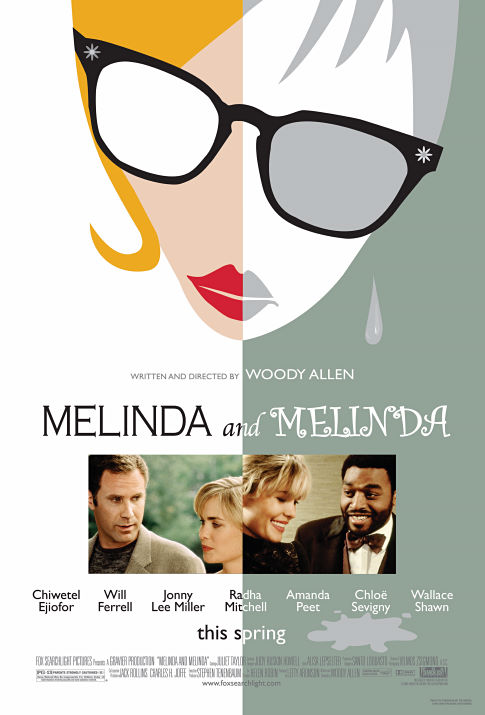
MELINDA AND MELINDA
(director/writer: Woody Allen; cinematographer: Vilmos Zsigmond; editor: Alisa Lepselter; cast: Chiwetel Ejiofor (Ellis), Will Ferrell (Hobie), Jonny Lee Miller (Lee), Radha Mitchell (Melinda), Amanda Peet (Susan), Chloë Sevigny (Laurel), Wallace Shawn (Sy), Larry Pine (Max), Daniel Sunjata (Billy), Steve Carell (Walt), Josh Brolin (Greg, dentist), Brooke Smith (Cassie), Zak Orth (Peter), Vinessa Shaw (Stacey), David Aaron Baker (Steve); Runtime: 99; MPAA Rating: PG-13; producer: Letty Aronson; Fox Searchlight Pictures; 2004)
“It’s all about the same old Woody rehashed musings over struggling artistic New Yorkers living in swell brownstone apartments.”
Reviewed by Dennis Schwartz
Another sour film that points to the long descent Woody Allen has taken to reach a level of such mediocrity. The gimmick here is that you get two films in one, never mind they both stink. It comes with a simpleminded theme that life can be a comedy or a tragedy, it all depends on how you look at it. It begins over talk in a bistro where two sophisticated playwrights, comedy writer Wallace Shawn and dramatist Larry Pine, doing a soft-soap version of My Dinner With Andre, tell how they can take the same story presented by another diner and make it either a comedy or a tragedy. The story involves a defiled character named Melinda (Radha Mitchell, the Aussie actress in the dual role), who unexpectedly arrives at a dinner party in Manhattan to visit one of her old married college girlfriends from her days at Northwestern. Melinda’s two tales go off in the direction of the two genres mentioned above, and by the end we are supposed to realize that there’s little difference between comedy or tragedy (hardly a startling revelation!). What the film lacked to pull off its promising premise was wit, good dialogue, the right actors for the part (Will Ferrell, in particular, seems lost fumbling around as a schlemiel mouthing lines usually intended for Woody), anything that is serious to think about, and a zaniness demanded of such an attempt to mix screwball comedy mixed with soap opera melodrama.
Will Ferrell is Woody’s alter ego in the comedy version. He plays an unemployed actor whose sex life with his wife is on hold, while his indie director wife Amanda Peet has gotten wealthy Steve Walsh to produce her feminist film The Castration Sonata. Ferrell is hoping for a part in the film, which wifey says he’s perfect for, but is turned down by the producer because he’s an unknown. Peet’s energy is directed in finding Mr. Right for the ditsy Melinda, someone Ferrell fantasizes he’s in love with only to be disappointed that she falls in love with smoothy black classical pianist Chiwetel Ejiofor.
In the tragic version, nutty Melinda crashes the dinner party of her wealthy Park Avenue trust-fund college friend Chloe Sevigny and her womanizing unemployed actor hubby Jonny Lee Miller, who are entertaining Brooke Smith (the third close girlfriend from their college days, who is married, pregnant with her third child and the stable one of the three). Melinda lays out her tale of woe: telling how her ideal doctor husband has left her and won custody of their two perfect kids because of her extra-marital affair with a photographer, whom she later murdered when he ditched her. This leaves Melinda suicidal and afraid of entering another relationship, as she turns down hunky, wealthy and stable dentist Josh Brolin. But, at the same dinner party, where she rejects the dentist, she begins an affair with the pianist.
The only difficulty in the film came from trying to keep track of the characters in each story and not anything deep to muse over. In any case, it’s all about the same old Woody rehashed musings over struggling artistic New Yorkers living in swell brownstone apartments and carrying on a yuppie-like party social life that leaves them in angst. The 70-year-old Woody has no part, which comes after complaints he was too old to be chasing the younger actresses as the romantic lead. Also, Woody seems to be answering his critics who said he left blacks out of his films by providing two juicy roles for black actors Chiwetel Ejiofor and Daniel Sunjata, who take not stereotypical parts that are not sensationalized and add whatever gravitas can be mustered from the film by romancing desirous white women.
REVIEWED ON 4/2/2005 GRADE: C-